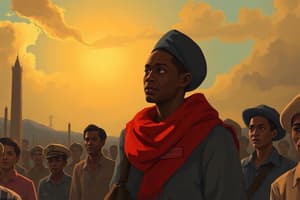Podcast
Questions and Answers
Flashcards are hidden until you start studying
Study Notes
- World War I takes place during a time of rampant white supremacy in the United States, denying African-Americans equal rights despite their citizenship.
- At the onset of the war, the majority of African-Americans reside in the rural South, decades after the Civil War, under a new system of segregation and sharecropping.
- Opportunities in war industries in the North for African-Americans arise, leading to the Great Migration of nearly one million African-Americans by 1919.
- Women, both white and African-American, play significant roles in supporting the war effort through various organizations.
- African-American women are denied the opportunity to serve as nurses or work in the YMCAs abroad, while only two are allowed to go.
- African-Americans contribute substantially to the war effort, raising over $250 million in war bonds despite having little wealth.
- The question of whether African-Americans should serve in the war arises, with motivations being a desire to prove loyalty and patriotism for acceptance as citizens.
- African-American soldiers face a range of experiences, with some performing labor work and others serving in combat units, like the Harlem Hellfighters, who compile impressive records.
- The Harlem Hellfighters, made up of 12,000 men, experience a stark contrast when they are sent to serve in French divisions and achieve great successes.
- Black soldiers return from the war expecting better treatment but face hostility and resentment from white Americans, leading to racial riots in 1919, known as the Red Summer.
- W.E.B. Du Bois, upon interviewing African-American troops in Europe, declares "We return from fighting. We return fighting," signaling a continued fight for equality and a stronger push towards the civil rights movement.
Studying That Suits You
Use AI to generate personalized quizzes and flashcards to suit your learning preferences.



